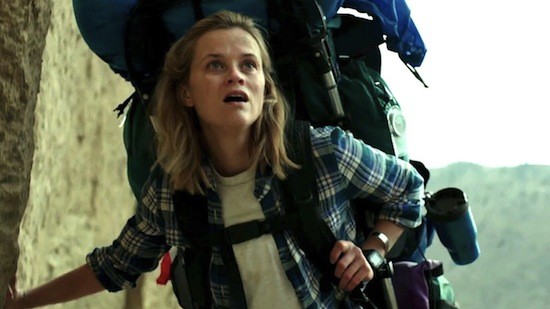I’m not much of an outdoorsman, but I do like to hike. My primary reaction to seeing Reese Witherspoon’s Oscar bait movie Wild was an urge to tramp senselessly through a wilderness setting for a few days. My secondary reaction is that Witherspoon’s probably got a shot at taking home some hardware come Academy Awards time.

Directed by Jean-Marc Vallée, who this time last year was getting Oscar buzz for Matthew McConaughey and Jared Leto with Dallas Buyer’s Club, Wild is baed on a memoir by Cheryl Strayed that was a runaway bestseller in 2012. After the death of her mother, Strayed spiraled into depression and addiction. Hitting rock bottom, she rejected conventional therapy in favor of embarking on a seemingly Quixotic quest: Hiking the Pacific Crest Trail from Mexico to Canada by herself.
Wild’s secret weapon is the screenplay by Nick Hornby, the novelist whose first novel High Fidelity was released in 1995, the same year Strayed set out on her epic hike. Hornby deftly adapts Strayed’s life story, using flashbacks to add just enough complexity to keep the story interesting without sacrificing clarity. In the flashbacks, we meet Strayed’ mother, Bobbi Grey (Laura Dern) whose upbeat attitude in the face of adversity and ultimately death both enlivened Strayed and seemed to set an impossible standard for her to live up to.
Dern is terrific in this all-important supporting role, but it’s Witherspoon’s party, and she delivers the goods. She traces Strayed’s parallel journeys, the physical one of slow, uneven progress north and the spiritual one of breaking down and building back up. Finding oneself by going back to nature is a core American narrative that goes back before Thoreau went to Walden Pond, and it retains it potency even today. Strayed didn’t exactly blaze new trails through the forest like Deerslayer, but when she’s a lone woman wandering through the desert wondering whether she’s going to be done in by her own city-girl inexperience or the ever-present danger of sexual violence from men who might help her, the stakes feel real. One of the unexpected highlights of Witherspoon’s performance comes in a comic early scene where Strayed, hitchhiking to avoid a snowed-in mountain pass, is interviewed by a reporter for a publication called the Hobo Times. Witherspoon all but stamps her feet insisting that she is not a hobo, even though everything the reporter is saying fits her situation perfectly, until she snatches his offer of a hobo care package out of his hands.
It does help that the admittedly predictable story transpires in unabashedly beautiful natural settings, from snowy mountains to the high desert. Cinematographer Yves Bélanger’s fine, occasionally digitally enhanced, landscape photography could inspire some serious wanderlust, but that could just be a sign that your intrepid reviewer needs to get out of the house more. Regardless, Wild is a cinematic journey worth taking.